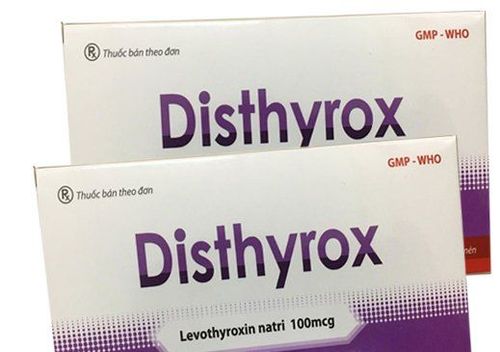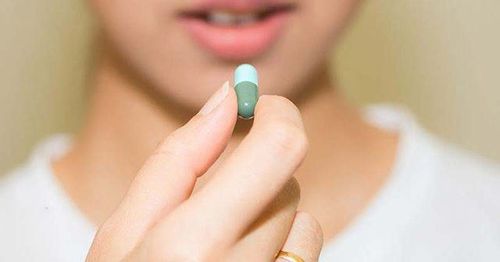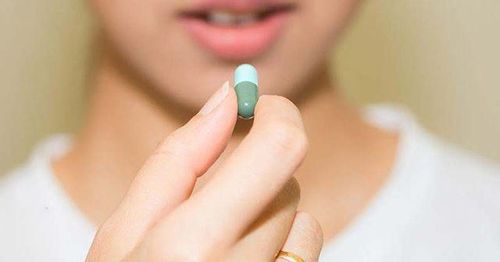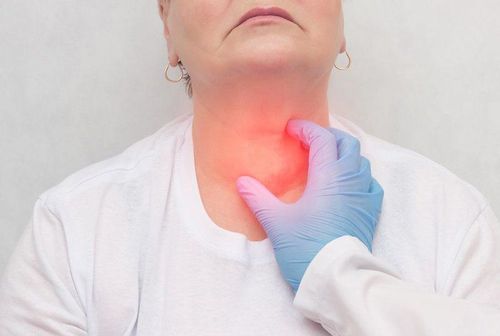This is an automatically translated article.
Levosum is indicated for use mainly for the prevention of recurrence after simple goiter surgery. To better understand Levosum as well as how to use it to get the most effectiveness, please follow the content below!
1. What is Levosum?
Levosum is a thyroid hormone supplement, used as an alternative treatment for cases of hypothyroidism (except for transient hypothyroidism during the recovery of subacute thyroiditis). In addition, the drug is also used to inhibit the body's secretion of thyrotropin (TSH). Levosum is a pharmaceutical product of Samnam Pharmaceutical Co., Ltd, Korea, prepared in the form of tablets with the main ingredient being levothyroxine sodium with a content of 0.1mg.
2. Indications and uses of Levosum
2.1. Indications for use of Levosum According to the doctor's recommendation, Levosum is usually indicated for use in the following cases:
Support treatment for patients with hypothyroidism. Prevent and limit the risk of recurrence of benign goiter. Helps to rebalance thyroid hormones. Support recovery for patients with hyperthyroidism. Used for patients who have just undergone surgery for malignant tumors. 2.2. Uses of Levosum Normally, the thyroid gland will produce 2 main hormones, including triiodothyronine T3 and thyroxin T4. The main active ingredient levothyroxine in the drug Levosum acts as a paralytic isomer of thyroid hormone T4, which helps to increase the metabolic rate of body tissues and effectively regulate cell growth and differentiation. . If the child's body has a deficiency of the hormone thyroxin T4, it will lead to conditions such as growth retardation, growth retardation, malnutrition, rickets, brain retardation, or delayed ossification at the ends of long bones. The active ingredient levothyroxine sodium in Levosum has the ability to increase oxygen consumption in tissues, thereby effectively helping to improve the basal metabolic rate in the body, lipid, protein and sugar metabolism. Not only that, the active ingredient levothyroxine also works to prevent and treat some tumors in the thyroid gland, and at the same time, helps reverse the decline in thyroid hormone. In addition, Levosum also helps increase the ability to contract the heart muscle, which significantly improves the functioning of the heart muscle.
In terms of pharmacokinetics, the active ingredient levothyroxine in Levosum has the following characteristics:
Absorption: Active levothyroxine is absorbed mainly in the jejunum, ileum and a small amount in the duodenum. The absorption rate of levothyroxine ranges from 48-79% depending on a number of different factors. Distribution: Approximately 99% of levothyroxine is bound to plasma proteins. Metabolism: Hormones T3 and T4 will bind with sulfuric and glucuronic acid in the liver. Elimination: The plasma half-life of T3 homrone is one day, and T4 is 6-7 days. The two hormones are mainly secreted into the bile. 2.3. The following are some cases where Levosum should not be used as recommended by a doctor, including:
Avoid taking Levosum for patients with a history of allergy to the active ingredient levothyroxine or hypersensitivity. with any of the excipients in the drug. Levosum should not be used in patients with untreated thyroid toxicity, adrenal insufficiency or acute myocardial infarction. Levosum is contraindicated in patients with symptoms of hyperthyroidism, angina pectoris, myocarditis, adrenocortical insufficiency or the elderly with myocardial infarction with thyroid.
3. Dosage and how to use Levosum
3.1. Dosage of Levosum The dose of Levosum will be determined based on the patient's medical condition as well as the age of the patient, specifically:
Treatment for people with hypothyroidism:
Adult dose: Take from 0, 5 - 1 tablet / day, from 2 to 4 weeks can gradually increase the dose to a maximum of 1.5 - 2 tablets / day. Dosage for children: Take 0.5 tablets / day. Support dose to prevent and limit the risk of recurrence of benign goiter: Take 1-2 tablets / day.
Treatment dose in case of hyperthyroidism has been brought to normal: Take from 0.5 to 1 tablet / day.
Dosage for people who have just undergone surgery for malignant tumors: Take from 1.5 to 3 tablets / day.
Note that the above recommended doses are often used in the treatment of thyroid diseases, so they are for reference only. The specific dose of Levosum depends on the severity of the disease and different patient populations. In order for the treatment process to bring the best results, the patient needs to follow the doctor's prescription and medication instructions.
3.2. How to use Levosum Because Levosum is made in the form of tablets, so patients need to use it orally. Levosum should be taken on an empty stomach, preferably about 30 minutes before breakfast. You can take Levosum tablets with filtered or boiled water in the right amount. Avoid taking the medicine with milk, carbonated water, soft drinks, beer, alcohol or other stimulants. For young children, the tablet can be dissolved to form a suspension, making it easier for children to take.
For more detailed information on how to use Levosum, you should carefully read the instructions for use included in the medicine box or consult your doctor.
3.3. What should I do if I overdose or forget a dose of Levosum? How to handle an overdose of Levosum
When taking an overdose of Levosum, the patient may experience some of the following reactions:
Restlessness, nausea, palpitations or fever. People sweat a lot, have signs of weight loss or increased appetite. Symptoms of digestive disorders, diarrhea, abdominal cramps. Increased blood pressure, arrhythmia or increased heart rate. Insomnia, fear of heat, tremors or menstrual disorders (in women). When the above symptoms appear, the patient needs to reduce the dose or temporarily stop using Levosum. For acute overdose, it is necessary to take the patient to a medical facility for support and quick treatment of symptoms. The treatment of Levosum overdose is mainly focused on countering the effects of the drug on the peripheral and central nervous systems (especially those that can increase sympathetic activity), and reduce the absorption of the drug. levothyroxine in the gastrointestinal tract.
In case the patient takes an overdose of Levosum but does not have symptoms such as loss of vomiting reflex, coma or convulsions, the doctor may apply gastric lavage or induce vomiting to minimize the symptoms. Overdose. If necessary, the doctor may also give the patient oxygen or maintain ventilation. Occasionally, Levosum overdose is also managed by using Cholestyramine or activated charcoal to reduce the absorption of levothyroxine.
For cases of Levosum overdose with symptoms of increased sympathetic activity, the doctor will give the patient a beta-adrenergic blocker, such as propranolol intravenously from 1 to 3 mg over 10 minutes, or Take about 80-160mg of propranolol per day. In patients with signs of congestive heart failure , the doctor may prescribe the use of cardiac glycosides .
*How to handle a case of forgetting to take a dose of Levosum
When you forget to take a dose of Levosum, the patient should take that dose at the time of remembering as soon as possible. If it is almost time for your next dose, you should skip the missed dose and continue taking it as scheduled. You should avoid taking 2 doses of Levosum at the same time, as this can lead to an overdose and cause dangerous side effects to your health.
4. Some side effects of Levosum
Here are some side effects of Levosum that patients may experience during use, including:
Common side effects: Restlessness, fever, sweating, palpitations, increased sensitivity appetite, weight loss, abdominal cramps, digestive disorders, diarrhea, increased heart rate, arrhythmia, increased blood pressure, menstrual disorders, insomnia, fear of heat or tremors. Uncommon side effects: Patients may experience hair loss while taking Levosum. Rare side effects: Urticaria, heart failure, allergies, osteoporosis, pseudotumor in the brain in children, increased metabolism, promote early healing of the skull joint in children. When experiencing any of the side effects mentioned above, the patient should immediately notify the doctor or quickly go to a medical facility for timely support to limit the risk of dangerous sequelae. after.
5. Levosum drug interact with other drugs?
In certain cases, Levosum may interact with the following active ingredients or drugs:
Tricyclic antidepressants: When used together with Levosum can increase effects as well as toxicity The properties of both drugs are due to the patient's increased sensitivity to catecholamines. Antidiabetic drugs insulin: May cause blood sugar to rise when taken in combination with Levosum. Therefore, when using the drug, patients need to closely monitor the blood sugar index. Corticosteroids and anticoagulants: When used together with Levosum can change the metabolism of both drugs, so the doctor needs to adjust the drug dose to suit the patient. Beta-adrenergic blocking agents and cardiac glycosides: May reduce the effectiveness of these two drugs when taken with Levosum. Amiodarone or cytokines: Taking with Levosum causes hypothyroidism or hyperthyroidism. Sympathomimetics: Increased risk of coronary insufficiency in patients with coronary artery disease when co-administered with Levosum. Maprotiline or ketamine: Concomitant use with Levosum can cause increased blood pressure, increased heart rate, or arrhythmia. Theophylline: Decreased clearance of the drug if combined with Levosum. Drugs somatrem, somatropin or sodium iodide: Causes rapid ossification of the ends of long bones and reduces the absorption of radiolabeled ions.
6. Some notes when using Levosum
6.1. What precautions should be taken while using Levosum? Before and during the use of Levosum, patients should note the following:
People with jobs that require high concentration such as operating machinery or driving vehicles should be cautious when using this medicine. Levosum. Levosum should be used with caution in people with high blood pressure or cardiovascular diseases. Levosum should be used with caution in people with diabetes insipidus, diabetes or adrenal insufficiency. The duration of treatment with Levosum can be lifelong. For pregnant women, caution should be exercised when using Levosum because there have not been any warnings about the effect of the drug on the fetus. On the other hand, the amount of thyroid hormone during pregnancy can be high, so women should periodically check the serum TSH level so that the doctor has information to adjust the dose of Levosum accordingly. For women who are breastfeeding, caution should also be exercised when taking Levosum. According to research, the hormone levothyroxine can be excreted in small amounts in the milk glands, although they are unlikely to harm the baby and do not cause tumors in the mother, but you should still talk to your doctor. about the benefits and risks that Levosum brings during this period. 6.2. Instructions for proper storage of Levosum Levosum should be stored in its original blister pack in an airtight container, at room temperature (below 30 degrees Celsius). The drug should be placed in a dry place, away from direct sunlight and places with high temperature.
In addition, you absolutely do not store the medicine in humid places such as the bathroom or refrigerator, as this may affect the action of the medicine. In case the medicine shows signs of wetness, mold or changes in shape, you need to quit and avoid using it again.
Levosum is indicated for use mainly for the prevention of recurrence after simple goiter surgery. To ensure effective treatment and avoid unwanted side effects, patients need to strictly follow the instructions of the doctor or pharmacist.
Follow Vinmec International General Hospital website to get more health, nutrition and beauty information to protect the health of yourself and your loved ones in your family.
Please dial HOTLINE for more information or register for an appointment HERE. Download MyVinmec app to make appointments faster and to manage your bookings easily.













